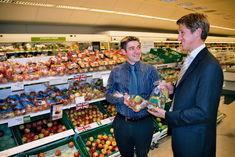
The first tree ripened Cox, which arrived at Waitrose stores on September 12 and was followed by Royal Gala on September 17, has allowed it to claim to be the retailer stocking the largest percentage of English apples and pears .
"An early start to harvesting has meant that there are 13 different varieties available for customers," confirmed Rik Connor, category manager for Fruition. "These include traditional conventionally grown favourites like Cox, Gala, Bramley, Conference and Comice, supported by our specialists which provide D'Estival and exclusive Suffolk Pink at this time in the season.
"In addition we stock English pears, Charles Ross and Regal Prince in our organic range, which when included with the different types of presentation, means there are 17 different opportunities for customers to select."
Tom Richardson, fruit buyer added: "It is another example of our strategy to maximise the amount of English fruit we sell, but we will only stock it when it is ready to eat. There is no point rushing at being first to market to only disappoint your customers and undermine the quality of English fruit."
Waitrose has also continued to expand its support of identifying regional food. Top fruit is being packed under the ‘Wales’, ‘Heart of England’, ‘West Country’, ‘East Anglia’, ‘South of England’, and ‘Kent’ sub-brands.
Richardson visited the Paddock Wood branch last week to see fruit marketed under its Kent Regional brand before going on to visit growers. These included the 100 acre Waitrose orchard at Chislet growing Braeburn and Jazz, belonging to Paul Mansfield.
In addition he saw Taylors Gold and the organic orchard, which includes new varieties Pinova, Juliet, Evelina, Dalinbell and Zari, as well as Regal Prince, Spartan and Charles Ross, supplied by Nick Moor. Moors apple local juice featured in the most recent Waitrose TV advert.
While expressing every sympathy with growers who had suffered hail damage, he added: “We are doing everything we can to help. Two years ago Waitrose’s own Leckford estate in Hants had the same problems. Where it is possible we will be selling still highly acceptable fruit graded as Class 2, and identifying the reason."
And looking to the future Richardson wants to build further upon the 24 percent of the English Braeburn crop it handled in 2006 to extend this further in replacement of imported fruit.



